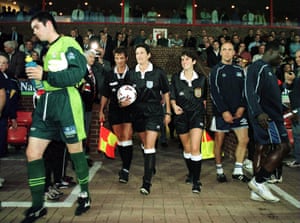Two-thirds of women working in football have experienced gender discrimination in the workplace according to Women in Football’s biggest survey.
In collaboration with Sports Marketing Surveys, questions were sent to the 4,200 members of Women in Football (WiF) and the organisation’s chair, Ebru Köksal, said the results were “heartbreaking and devastating”.
“In this day and age, it’s no longer acceptable,” Köksal said. “Inherent sexism in the game has been continuing for decades.”
The findings show that only 12% of incidents were reported and Köksal said there was “still a lot of fear” of speaking out. “A lot of women have got to where they are on hard work and, a lot of the time, much more merit than their male counterparts and they don’t want to lose that hard-earned position and status,” she said.
WiF’s members are a network of professionals who work in every area of the game, on and off the pitch. The survey showed that when problems were reported they were “brushed under the carpet” with the most common form of discrimination labelled “banter”.
The WiF ambassador and former referee Janie Frampton, who reached an out-of-court settlement with the Football Association in 2013 after she took the governing body to an employment tribunal following a dispute over her dismissal, said: “Myself and Wendy Toms were the first two women [referees] that came through the men’s professional game in the 90s. Both of us have said so many times since that we probably had too high a tolerance level, at the time, because we just wanted to fit in.
“Now, we’ve come on 30 years and we are still experiencing the same issues. I talked to a lot of women referees and coaches, and there is still this massive fear factor around reporting situations. I find that really tough. Wendy and I were treated as a circus – I don’t want that to still be the case now.”

In response to the findings, WiF is launching a corporate membership scheme to work with governing bodies, clubs and other football stakeholders in eradicating the issue. It is also starting a youth council and has expanded its Vikki Orvice directorship scheme (named in honour of the late sports journalist), which provides boardroom experience, from one candidate a year to two.
Köksal said of the corporate membership scheme: “We don’t want to just stand on the sideline and criticise – that’s the easiest thing you can do … What can organisations actually do about it? We are here. Come to us. We feel we’re experts and we want to help. We want to work together to make things better for the organisations as well as the women, and men – if you have an unhappy woman working in your department and you don’t know why it affects the performance of the department and the whole organisation as well.”
Bringing male allies on board is a key part of the strategy. “Throughout my 30-year career, whether it was in finance or in football, I had some great male allies and supporters who basically protected me from all this banter and chatter and those trying to tackle me,” Köksal said.
“They said: ‘You are very talented, you’re very knowledgeable, I’m covering your back, we just keep running.’ Those were the times that I excelled and performed the best. [As managing director] I finished the Galatasaray stadium, restructured the club’s debt and merged three companies that we had on the stock exchange, a reverse merger, a very complicated transaction. It was all possible because they actually kept me out of the politics and they let me just deliver and implement.”
In creating a youth council WiF hopes to harness the “different mind-frame” of its younger members. “There’s an opportunity to get some great ideas and also have them reverse mentor us,” Kökal said.
“I would love it if we had to shut down and disappear in 10 years, because there’s no more discrimination, right? That means we’ve done our work really well. So making ourselves obsolete would be the ultimate goal.”
from Football | The Guardian https://ift.tt/3ntqnOR
via IFTTT

No Comment